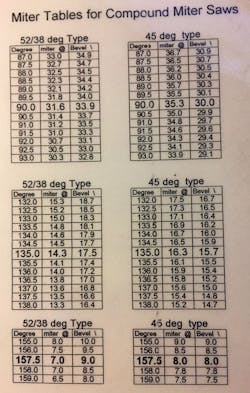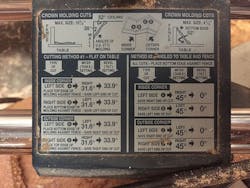Cutting Crown Molding on the Flat
New trim carpenters often ask how to cut crown molding with a miter saw.
There is a lot more to cutting and installing crown molding than there is to cutting and installing baseboards or any other molding that sits flat against the wall. Those cuts are two-dimensional.
Because crown molding bridges the ceiling/wall planes, the face of the molding is not in plane with either surface.
And the cuts are even weirder.
Two ways to cut crown molding:
One way to cut crown molding it to use the 90 degree intersection of the table and fence on a miter saw to play the part of wall and ceiling. When doing this, the fence plays the part of the wall and the table plays the part of the ceiling.
So the crown molding sits upside down on the saw. The saw blade can be swung 45 degrees, and the blade will slice a perfect compound miter in the crown.
The other way to cut the crown molding it to lay it flat on the table and use the bevel adjustments of the blade to dial in the correct compound miter angles. To cut this way, you need to know the spring angle of the crown molding and the bevel.
Critical crown molding definitions
spring an·gle | spriNG ˈaNGɡəl (noun)
"The angle between the back of the molding and the wall, when the molding is installed."
—Gary Katz in Spring Angles and Angle Finders
The main spring angles are 45/45 and 52/38, corresponding with the top and bottom angles on the crown molding, respectively.
To find out what the spring angle is, set the crown molding into the crotch of a framing square and check where the ends align. if both numbers are the same, it is 45/45 crown. If the numbers are different, such as three inches on the wall and two inches on the ceiling, it is 52/38 crown.
bev·el |ˈbevəl (noun)
"The angle which one surface of a body makes with another surface when they are not at right angles."
—Dictionary of Architecture and Construction, McGraw Hill
mi·ter |ˈmīdər (noun)
"A joint made between two pieces of wood or other material at an angle of 90 degrees such that the line of junction bisects this angle."
—The New Oxford American Dictionary
What are the angles for cutting crown molding?
Swing the table to cut the miter, Tilt the blade to cut the bevel.
To find the correct bevel and miter angles, use a chart, such as this one, which was laminated for jobsite use by a carpenter named Bruce Abernathy:
How to cut crown molding inside corner 22.5 degrees
Some miter saws also have charts built right into them, such as the chart on this Bosch miter saw showing how to cut crown molding on the flat as well as "upside-down and backward":
A few tips for cutting crown molding with a miter saw:
Make a couple of sample pieces—a pair of inside and a pair of outside corners. Use these samples to check the angles against reality, and to help you visualize the molding in place, when you are standing at the saw trying to remember which way is up.
When cutting from an inside to an outside corner, Paul recommends cutting the inside corner first because it is easy to hook the end of the cut with a tape measure to mark the next cut.
When measuring short point to short point, such as for outside to outside corners, you can do one of two things:
- Burn an inch and subtract from your measurement, which works well for short pieces.
- Clamp a speed square to the crown molding aligned with the short point and hook the speed square with your tape.
Align the blade with the edge of the line and cut. Do not cut the line; leave it.
Test drive the piece to make sure it fits; with the line left, you should be able to trim it into position if needed.
There is a lot more to hanging crown molding than this short introduction, but we will leave it there for now.


